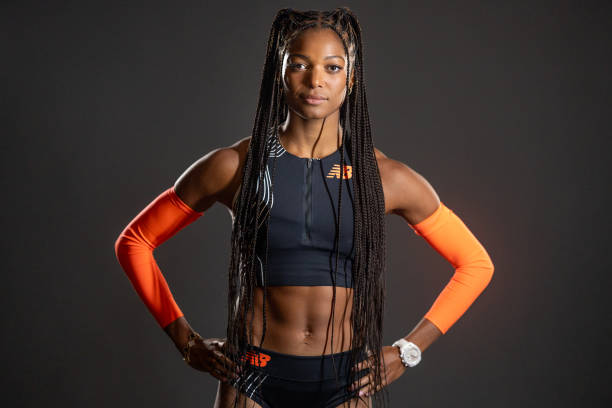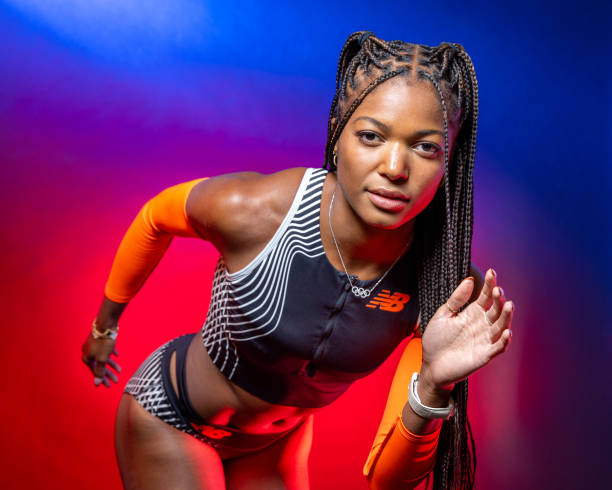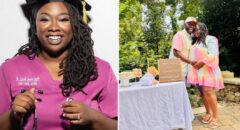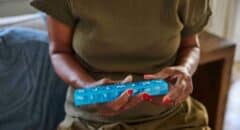
In the world of track and field, Gabby Thomas shines as a two-time Olympic medalist with a passion that extends far beyond the finish line.
“I grew up doing pretty much every sport under the sun, mainly soccer. I started running reluctantly because my mom kind of forced me to, but I ended up falling in love with it because it’s such a unique sport,” the 27-year-old tells BlackDoctor.org. “You can really see the progress that you make: what you put in, you get out. I started setting goals for myself, achieving things, and working towards my accomplishments.”
Eventually, her hard work landed her a position on the Harvard track and field team where she grew to love the sport.
“It was when I broke the NCAA record in college and won my first NCAA championship that catapulted me into my professional career. After that, I continued to love the sport. I fell in love with the process and the journey of getting better, growing, and being the best version of myself that I could be as an athlete. Then, I made the Olympic team, and the rest is history,” Thomas shares.
While her journey from a multi-sport athlete to a record-breaking track star is captivating, it’s her dedication to promoting health equity, which started while taking a course at Harvard called “Sick and Tired of Being Sick and Tired”, that truly sets her apart.
“It was pretty mind-blowing to actually learn a lot of things that you don’t learn in high school or even in your college courses,” Thomas, who suffered a health scare in 2021 when an MRI revealed a tumor on her liver, shares. “I really had to go out of my way to seek out this information. I learned how underserved communities and marginalized populations are affected, especially in terms of their healthcare. People with socioeconomic disparities are disproportionately affected, and this includes people of color.”

Seeing how factors beyond most people’s control, like not having transportation to see doctors, not being able to afford healthy food, and not having time to exercise, affected the health outcomes of underserved communities prompted Thomas to take action.
“It was shocking to me. So, I started taking more sociology courses at Harvard to supplement this information, and then I decided to get my master’s in public health [at the University of Texas],” says Thomas, who also earned her Bachelor’s degree in neurobiology during her time at Harvard. “That’s when I really developed this fundamental understanding of what I could do to make a difference. So, I’ve dedicated a lot of my time to improving these health outcomes.”
When she’s not on the field, Thomas dedicates much of her time to volunteering at Volunteer Healthcare Clinic in Austin, Texas
“I spend a few hours of my week here. I’m currently responsible for recruiting volunteers, and I track patients’ lifestyle habits. I direct them to resources they need, including doctor’s visits and medications. I really develop a strong relationship with each individual patient, so we’ve developed this holistic approach to healthcare,” she says. “I think this is important because you understand the barriers they face personally and can actually improve their healthcare rather than the impersonal response you often see. It’s been impactful tracking their progress and seeing their health improve. The patients we see at the clinic don’t have health insurance or are very low income, so they wouldn’t have access to healthcare otherwise.”

Thomas’ passion for healthy equity has also led to a partnership with Eli Lilly and Company, the health equity sponsor for Team USA.
“I think the partnership with Lilly is exciting because it will expand not only my platform but also the discussion about health equity to even more people,” she adds. “They can see the work that Lilly does and maybe even become inspired themselves. Lilly increases diversity in clinical trials, expands access to medicines, and collaborates with patient advocacy groups. These are all examples of progress that others can look at and be inspired by.”
Looking ahead, Thomas hopes to continue making an impact both on and off the track. She aspires to reach her full potential as an athlete, aiming for a gold medal at the upcoming 2024 Paris Olympics.
“We are at the beginning of our outdoor season now, which means we are starting with actual track meets and competitions leading up to Paris. This is about sharpening up and ensuring that we’re fit and healthy as we head into the trials and then onto the Paris Olympics,” Thomas adds.
In preparation for the Olympics, Thomas is following a “physically demanding” workout routine that entails three hours on the track and a couple of hours in the weight room.

“We do really hard sprint workouts, but we also make sure that we’re resting and recovering just as much. Many people don’t realize how important rest and recovery are in the training process, especially at this elite level,” the two-time medalist notes. “It’s also important mentally to step away from the track, have moments to yourself to rest and regroup. This is also why I do things off the track and try to strike a balance between my track life, being a professional athlete, and my off-track lifestyle. I think that balance is crucial.”
As she continues to pursue her goals, both on the track and in her advocacy work, Thomas remains focused on inspiring young girls who aspire to follow in her footsteps.
“Follow your passions and figure out what matters to you. You can make a difference. On the track, I hope to reach my full potential as an athlete and be the best I can be, aiming for a gold medal in the future,” she shares. “I think this will be a great year to show the world and myself what I can do. Off the track, I hope to be the best version of myself and positively impact as many people as I can, especially in terms of their healthcare and health outcomes. I hope to inspire younger girls watching to continue working towards their passions and making a difference in their communities.”









